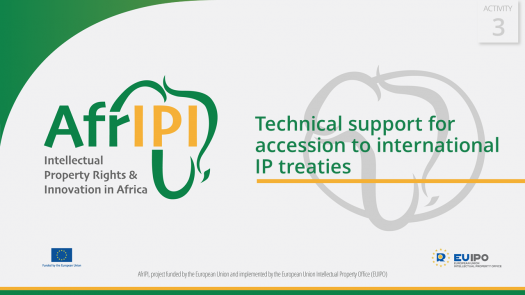Technical support for accession to international IP treaties
Since Nigeria has already expressed interest in becoming a party to the Madrid Protocol, it is proposed to focus the 2024 activity on this country and this area of work, and to eventually expand to include South Africa should conditions allow. For Nigeria, it is proposed to recruit an independent expert tasked with producing a study on: (a) the expected economic and social impact of possible accession to the Madrid Protocol; (b) the requirements for accession and the declarations to be made at the time of accession; (c) preparatory legal work to be undertaken (e.g. implementing provisions, declarations and notifications to be made upon accession), based on prior analysis of laws and regulations and of the replies to questionnaires on the office’s practice; and (d) promotional work to be undertaken by Nigeria’s IPO to ensure the proper implementation of the treaty. This could be complemented by a training session for the Nigeria IPO staff in late 2024.
In parallel, AfrIPI intends to support Mozambique, after its request for support to AfrIPI, sent to the ARIPO secretariat, in ratifying the Geneva Act on the protection of appellations of origin and geographical indications. Mozambique attaches a particular importance to intellectual property as a very powerful instrument for promoting social, economic, technological, and cultural development. With the support of various partners, including the EUIPO, Mozambique registered its first geographical indication, Cabrito de Tete, in 2020. In parallel, various other potential GIs were identified, namely Camarao de Sofala, piri-piri de Nhacuongo, Ananaz de Muxunge, Abacaxi de Nicoadala, and Café de Arabico. Under the Industrial Property Code (approved by decree N°47/2015 of December 31, 2015 – Regulations on appellations of origin and geographical indications (approved by decree N°21/2009 of June 3, 2009)), geographical indications enjoy additional protection. However, this protection is only available at the national level. For GIs with a regional or international reputation and market, the absence of protection in third countries will jeopardise the fight against misuses and expose the names of GIs to genericity on these markets. Therefore, the Government of Mozambique considered that one possible action to sustain their progress on GIs would be to seek support in drafting their instrument of ratification of the Geneva Act on the protection of appellations of origin and geographical indications. While the instrument may be provided by the treaty or could consist of a simple letter, the country may need transposition measures if their national jurisdiction does not allow a treaty to be directly enforceable after ratification. This may call for specialised legal and technical assistance to assess the required adaptation of the existing law on GIs once the treaty is transposed. The activity will be carried out in close cooperation with WIPO.
